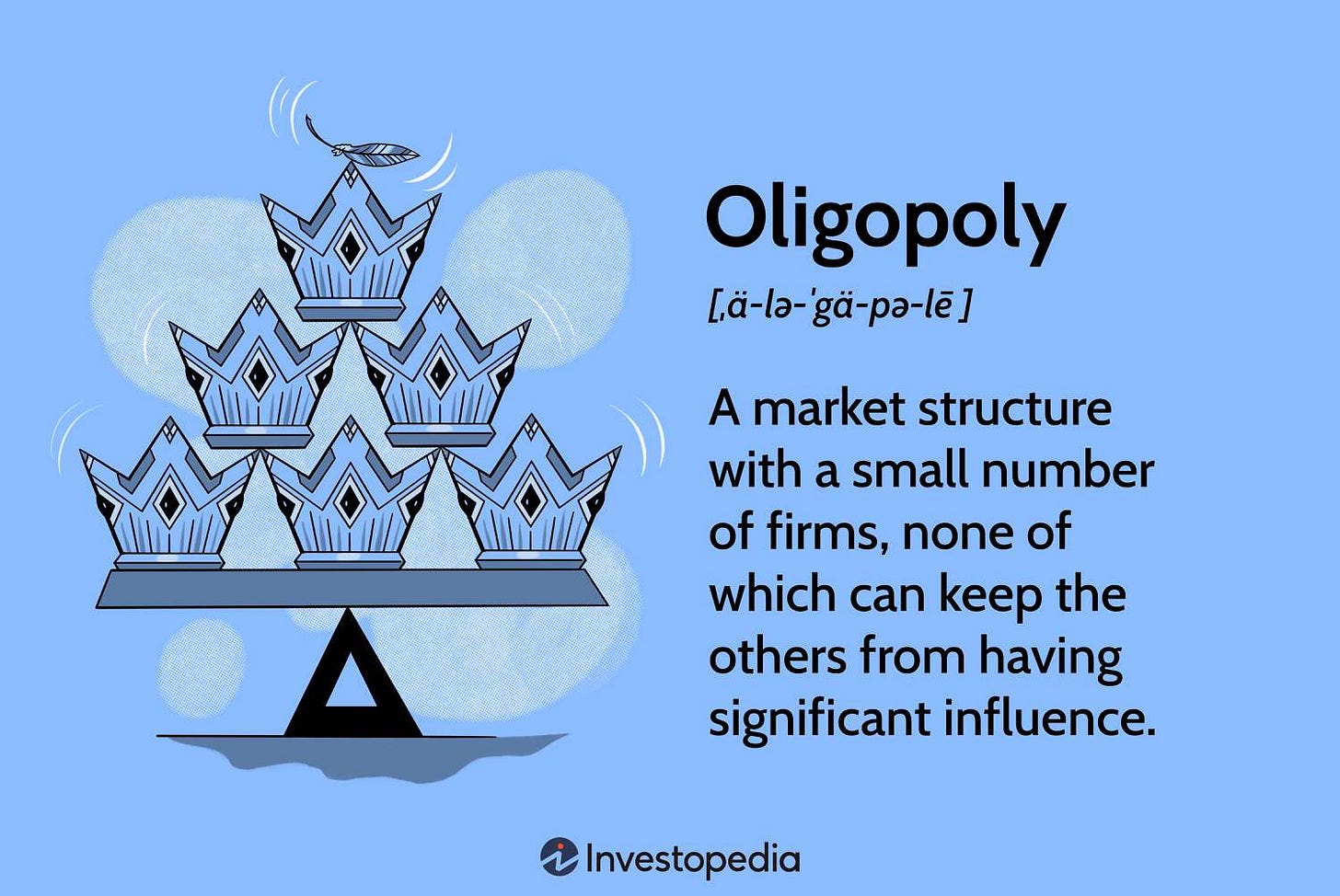Canadian Oligopolies - Ruining Canada's Economy?
First of all, thank you to many of you who have started subscribing to the newsletter! This will be the first post that many of you will receive, and will give you a feel for how my future articles will be laid out. As always feel free to give feedback or respond if you’re enjoying or have issues!
When you think of big corporate companies in Canada, one of the first groups that come to mind is the “Big 5 Banks” (we have a couple more now such as National or EQB). This is just one of the examples of the Oligopolies that run many of the Canadian sectors. Some more might include:
Banking: TD, RBC, Bank of Nova Scotia, CIBC, BMO
Retail: Loblaws, Metro, Sobey’s
Railways: Canada Pacific, Canadian National Railway
Telecommunications: Rogers, Bell, Telus
Airlines: WestJet, Air Canada
Insurance: Manulife, Great-West, Sun Life, Desjardins, Fairfax
You get the idea. But what exactly is an “oligopoly” in economics? Why is this affecting Canadian consumers? Let’s break it down quickly.
Types of Economic Markets
In economics, there’s different kinds of “competitive markets” which determine how companies interact with each other. These types of markets usually fall under capitalism as a whole, and this is how North America has operated for basically most of history. An oligopoly specifically is when a small group of companies operate over the entire market, and they cannot stop each other from having so much control.
The oligopoly is different than other types of market competition such as the monopoly, or monpolisitc/perfect competition. A monopoly is similar where instead of a few companies controlling the market, only one owns everything. An example of this (at least historically) is Canada Post in Canada, and the USPS for the Americans. They act as a monopoly because historically they have owned most of the entire mail service market.
On the opposite end, we have a monopolistic/perfect competition. Monopolistic competition aims at offering a variety of products and services that are all slightly different than each other. This means to gain an advantage you can offer many things such as price discounts, marketing or advertising, slight differences in products, brand recognition, etc. Some monopolistic competitions aim for what’s called a “perfect competition” where there is zero ways to start a monopoly or affect other businesses in any way (If you haven’t try reading up on different market types, it helps you understand how businesses operate depending on country, regulations, sector, competition, etc.)
The reason that the oligopolies in Canada have become such a big issue is because we are supposedly acting as a competitive market, and yet for most categories it’s impossible to compete at a national level in every sector. We are supposed to operate competitively, and you’re free to enter the market, however the market share is still controlled by a small select group of companies.
How Does This Affect Canadians?
The major accusation against most of the large oligopolies is collusion both with each other and the government. If you have the select companies who control the market share working together, this means you can basically set prices and influence consumers however you choose. This was most commonly seen in retail where grocery chains were accused of price fixing. A famous one was when Loblaws was accused of fixing the price of bread and raking in profits for executives.
This is the easiest example, but the problem doesn’t just stop there. If you’re Canadian and dealt with any major sector whether it be the banks, the telecoms, or the airlines, you’ll probably have more negative experiences then positive ones. Lack of trust in the banks, horrible service and prices for telecoms, and atrocious airline experiences are just some of the examples of dealing with these companies.
The problem is that if most of these major players are working together, or at the very least have similar interests, they don’t have to offer fair prices, good customer service, or really care about Canadian citizens. Their first and foremost priority has always seemed to be money. Funnily enough, some of them even do poorly at this: Bell, Rogers and Telus have all suffered financially and seem to be gaining more debt and less profits by the day. They continue to gather more Canadians to use their products, and yet can’t seem to produce extraordinary profits or offer good services.
So what can you do to help stop this? Well, unfortunately there isn’t a whole lot. The problem with Canada is we have very low population overall and we’re spread across so many provinces. You have Ontario which is almost half the population all in one area, but then the rest of Canada is so far apart in terms of land mass and density. In order to compete with these companies, you not only have to cater to all Canadians across the country, but also compete with these organizations that are almost extensions of the government itself. With so many laws and regulations further pushing these companies ahead of everyone else, it’s almost impossible to compete. This is why you don’t see many American companies trying to bridge into Canadian sectors, they simply can’t afford it. With such low density, they can’t offer the service across the nation without losing too much money.
Will these major businesses always hold so much power? It remains to be seen. Continue finding the best deals you can with what we have, and hopefully we’ll start to see more affordable and better options for Canadians.
As always, do your research and happy reading!
This is not and never will be financial advice. This is for educational purposes only, and please treat it as such.







